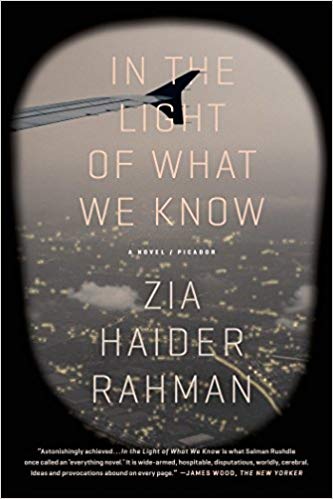You have /5 articles left.
Sign up for a free account or log in.
 In the Light of What We Know: A Novel by Zia Haider Rahman
In the Light of What We Know: A Novel by Zia Haider Rahman
Published in 2014
"Sometimes our actions are questions, not answers." --John le Carré, A Perfect Spy, from the epigraph to Chapter 5 of In the Light of What We Know.
The other night I was invited to a dinner on campus with Zia Haider Rahman, author of In the Light of What We Know. Zia (as he introduces himself to all with a smile) is a visiting fellow at my institution.
I want to talk a bit about this extraordinary book, which I read in preparation for the dinner.
But first, I want to talk about caste in academia.
Intimate dinners with the authors of novels are not the sort of campus invitations that I usually receive.
The other guests at the dinner were mostly all humanities professors -- faculty in departments such as English and music. As neither a professor nor a humanist, I felt particularly honored to be invited to this meal. I think that the reason that I got into academia was to go to these dinners -- to have conversations about novels and politics and ideas.
For the other dinner guests, a meal with a visiting novelist was likely not a first-time-ever academic experience. For this nonfaculty educator, firmly on the other side of the faculty/staff caste divide, the experience had all the exhilaration of an invitation to a previously inaccessible world.
Which brings me to the novel, and the novelist.
I want to give a plug to Zia Haider Rahman. If you are looking for a novelist, a public intellectual and an educator to come to campus to inspire your students and energize your faculty, then please get in touch with Zia.
The Zia that I met over the dinner is every bit the intense listener and erudite connector that you’d expect from the author of a novel as brilliant and expansive as In the Light of What We Know.
Some books are too big to neatly summarize, as they tell stories of entire lives (or generations) -- while illuminating something essential about the time in which the story is set.
This is a book about the families that we make (and unmake), the mortgage crisis, mathematics, the U.S. occupation of Afghanistan, immigration, the traumatic history of Bangladesh, class manners, meritocracy, friendship -- and much else.
Meeting Zia for dinner so soon after reading his semiautobiographical novel (he says, cheekily, 37 percent autobiographical) was an odd and moving experience.
Not being an English professor or a humanist, I did not know the social codes that govern these sorts of dinners. Was I allowed to ask about plot points? Can I talk about the characters that the author created as real people? How much is it acceptable to ask about what is imagined and what is drawn from one’s own story?
Thankfully, the professors at the dinner knew how to talk to an author about his book. In fairness, Zia made it all very easy. He was forgiving and patient with questions he’s likely to have heard too many times since the book’s publication. Never once did he make me feel like an unprepared outsider in the world of people who write and discuss novels. And for that, I am grateful.
I am also grateful for the invitation to dinner. Thank you.
If you are looking for a big book of history, relationships and ideas -- one set on a global stage and that will teach you many things (history, mathematics, etc.) while keeping you thoroughly engrossed -- then please read In the Light of What We Know.
If you have not lately invited a staff member to an event that customarily is only attended by faculty, then please do.
If you have not hung out with a group of humanities faculty, try to find an excuse to do so.
If you have not brought a visiting novelist to campus recently to interact with your students and professors (and staff), then send those invitations.
What novels are you reading?




